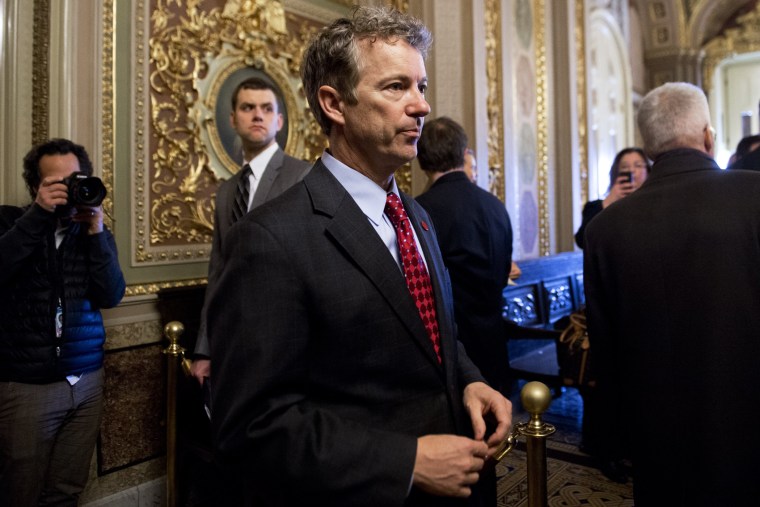Rand Paul this week announced a class action lawsuit against President Obama to curb the NSA’s ability to gather domestic phone records, insisting such surveillance efforts should be "specific to the person, to the place and to the items.” But lurking behind the policy argument is a clear political motive as well: the Kentucky senator, who’s considering a bid for the GOP presidential nomination in 2016, has argued for years that his libertarianism is just what the party needs to attract a younger, more diverse base.
Paul’s lawsuit, which is backed by former Virginia Attorney General Ken Cuccinelli and tea party group Freedomworks, is the latest phase in Paul’s long running campaign against government spying.
But lately his political motives have been more visibily attached to the war on surveillance.
Paul's asking Americans to show their support for his lawsuit by giving him their e-mail addresses and zip codes – information that some commentators noted is more valuable to a candidate building a voter database than to a judge considering a lawsuit.
Paul’s critique of the NSA isn’t unique to the right: many progressive activists are similarly appalled by evidence of widespread government spying. And opposition to such surveillance programs isn’t the only area where Paul has some overlap with the left. Some of his more libertarian positions, like scaling back the war on drugs and restricting drone strikes, also cross party lines. One of Paul’s top allies in the Senate when it comes to spying concerns is Ron Wyden, an Oregon Democrat who is also intensely critical of the NSA.
Paul has argued such crossover issues will attract voters not traditionally associated with the GOP. He’s made an effort to reach out to African Americans by criticizing mandatory sentencing laws. And he insists protesting government intrusion will win back the so-called Millennial voters -- young people born after 1980 who backed Obama by large margins in 2012.
Young voters "don’t really care as much about taxes, regulation, balanced budgets might not be their big deal either, but they care about their liberty, they care about their privacy,” Paul said at a forum hosted by Young Americans For Liberty in July. “I think if we do, the youth will come.”
Paul's efforts may even resonate with more traditional GOP base voters. Republican strategist Ford O’Connell told msnbc that Paul’s NSA attack would appeal to that group because it dovetails with conservatives’ general anxieties about government overreach under Obama.
“This is about not just getting to the general election and winning young voters, it’s also high on the mind of tea party folks and constitutional conservatives,” O'Connell said.
For now, neither party has a monopoly on the battle over civil liberties. Many Republican leaders, who gleefully attacked Democrats for opposing warrantless wiretapping under President Bush, are still uncomfortable with Paul’s positions. And Democrats have yet to reach a consensus either, with some more hawkish officials like Senator Dianne Feinstein aggressively defending the NSA's surveillance practices.
Some progressives are making a parallel case to Paul’s as well, arguing Democrats shouldn’t cede political ground to the GOP on the issue of privacy.
Shenna Bellows, a Democrat challenging Republican Sen. Susan Collins in Maine, has made the incumbent's support for the NSA and the PATRIOT Act her top campaign issue.
“Privacy is a winning issue in 2014 because there’s a really interesting coalition of progressives and libertarians across Maine and across the country interested in restoring our constitutional freedoms,” Bellows told msnbc in a phone interview. “I think privacy is incredibly important to young people who understand technology and understand that our laws have not kept pace with technology.”
Paul’s earned plenty of praise from progressives for his positions on surveillance, drone strikes, and drug laws. But his political ambitions can be a source of tension in those circles.
Paul is intensely conservative on budget issues, favoring the rapid elimination of huge swaths of the federal government, and he opposes abortion rights. His libertarianism has also led him to some politically explosive places, like criticizing the 1964 Civil Rights Act that ended segregation, and some fringe associations, like a neo-Confederate aide who resigned last year. And that’s not even counting his father’s far more inflammatory history.
The closer the younger Paul gets to a plausible presidential campaign, the harder it gets for some progressives to separate his issues from his ambitions.
Van Jones, the progressive activist and former Obama adviser who now hosts CNN’s Crossfire, carefully qualified his support for Paul’s filibuster against drone strikes last year by labeling him “a civil liberties hero and a civil rights villain” in a column. Liberal columnist Adele Stan took fellow left-wing activists to task over their support for Paul the same month, warning that they were legitimizing his more extreme positions by extension.
Concerns on the left about boosting Paul’s presidential stock might make it marginally harder to find activist allies for his policy causes, but they aren’t particularly relevant to his electoral ambitions. In fact, one of the biggest obstacles he could face in 2016 is that his rivals actually buy into his argument.
Many of Paul’s signature issues are gaining ground within the GOP. The Republican National Committee recently adopted a resolution sponsored by a Paul supporter decrying NSA spying. Texas Gov. Rick Perry, who might run again in 2016, recently suggested Texas move towards decriminalizing marijuana and has defended the right of states to legalize the drug. Chris Christie, who has clashed with Paul on national security issues, slammed the war on drugs as “a failure” in a speech last month. Two other likely presidential candidates, Senators Ted Cruz and Marco Rubio, joined Paul for his anti-drone filibuster last year.
Paul is surely heartened to see libertarian policies gain ground among Republican leaders. But the more they do, the less unique his appeal might be to Republican voters. There’s a long history of political insurgents fading away as the major parties co-opt their views. Paul’s biggest enemy could be success.
